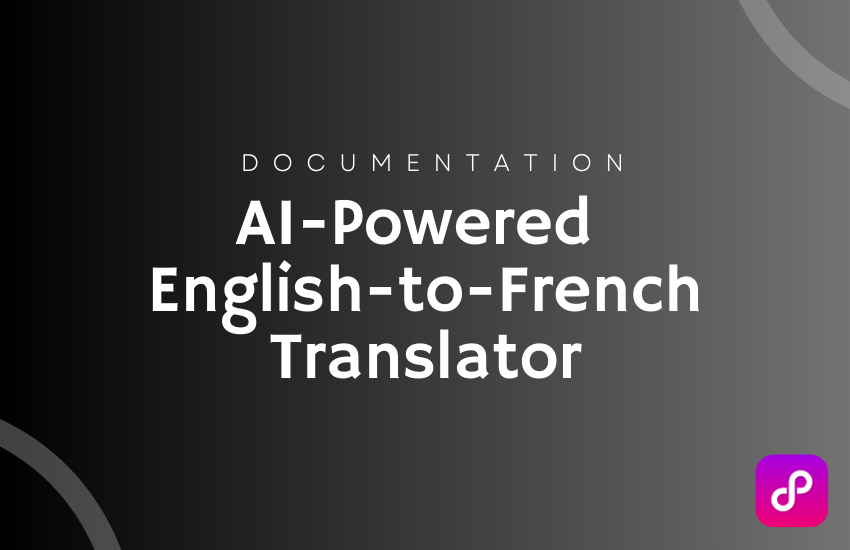
AI-Powered English-to-French Translator – Your Fast & Accurate Translation API
in Generative AI on March 11, 2025Introduction
Are you looking for a fast, accurate, and scalable way to translate text from English to French? Whether you’re a developer, business owner, or content creator, having an AI-powered translation API can significantly improve multilingual communication.
This blog introduces an English-to-French AI Translator built using FastAPI and OpenAI’s GPT-4. Learn how to set up, use, and integrate this translation tool into your applications.
Let’s dive into the best way to implement AI-driven translation! 🌍🚀
Why Use an AI-Powered Translation API?
This AI-based translation API offers seamless and natural English-to-French translations. Here’s why it stands out:
✅ Accurate & Context-Aware Translations
- Uses GPT-4, which understands context, tone, and grammar nuances.
- Provides fluent, human-like translations.
✅ FastAPI-Powered for Speed & Scalability
- FastAPI ensures low-latency, high-speed API responses.
- Easily scales to handle multiple translation requests.
✅ Easy Integration with Web Apps & Chatbots
- Supports JSON-based API responses, making it easy to use.
- Works seamlessly with websites, chatbots, and mobile apps.
✅ Customizable for Additional Features
- Modify the API to support multiple languages.
- Enhance security with authentication and rate-limiting.
Setting Up the AI Translation API
Step 1: Install Python & FastAPI
Ensure Python 3.8+ is installed. Check by running:
python --version
If not installed, download it from: 👉 Download Python
Next, install the required libraries:
pip install fastapi uvicorn openai pydantic
Step 2: Set Up OpenAI API Key
Get an OpenAI API key from OpenAI and configure it:
export OPENAI_API_KEY="your_openai_api_key"
For Windows, use:
set OPENAI_API_KEY="your_openai_api_key"
Step 3: Run the API Server
Navigate to your project directory and run:
uvicorn main:app --reload
Your API is now live at: 👉 http://127.0.0.1:8000/translate/
How the AI Translation API Works
1. Accepts English Text as Input
The API receives an input string from a user.
2. Sends Request to OpenAI GPT-4
The input is processed using GPT-4, which translates it into French:
completion = client.chat.completions.create(
model="gpt-4-0125-preview",
messages=[
{"role": "system", "content": "Translate English to French."},
{"role": "user", "content": input_str},
],
)
return completion.choices[0].message.content
3. Returns a JSON Response
The translated text is returned in JSON format for easy integration:
{
"translated_text": "Bonjour, comment ça va ?"
}
Using the Translation API – Step-by-Step Guide
1. Sending a Translation Request
To translate text, use a POST request:
curl -X 'POST' \
'http://127.0.0.1:8000/translate/' \
-H 'Content-Type: application/json' \
-d '{"input_str": "Hello, how are you?"}'
2. Using Python for API Requests
You can send requests via Python using the requests library:
import requests
url = "http://127.0.0.1:8000/translate/"
data = {"input_str": "Good morning!"}
response = requests.post(url, json=data)
print(response.json())
3. Sample API Response
{
"translated_text": "Bonjour!"
}
Customizing the API for More Features
Want to expand or customize the translation tool? Here’s how:
1. Add Support for More Languages
Modify the system prompt to include additional languages:
{"role": "system", "content": "Translate between English, French, and Spanish."}
2. Implement Authentication
To secure the API, add authentication using an API key header:
from fastapi.security.api_key import APIKeyHeader
api_key_header = APIKeyHeader(name="X-API-KEY")
3. Deploy on a Cloud Server
Host the API on AWS, Heroku, or DigitalOcean for global access.
4. Add Rate Limiting to Prevent Abuse
Use FastAPI’s dependency injection to limit requests per minute.
Troubleshooting Common Issues
| Issue | Solution |
|---|---|
| OpenAI API key not found | Ensure the API key is set in the environment variables. |
| API server not starting | Check dependencies with pip list and reinstall if needed. |
| Slow translation speed | Optimize responses with caching and async requests. |
| FastAPI not recognized | Ensure fastapi is installed (pip install fastapi). |
Frequently Asked Questions (FAQ)
1. What does this API do?
It translates English text into French using GPT-4 AI translation models.
2. Can I extend it for more languages?
Yes! Modify the system prompt and API parameters to support additional languages.
3. How fast is the translation?
Most translations are processed within milliseconds, depending on server speed.
4. Is this API secure?
Yes, but it’s recommended to add authentication and rate-limiting for security.
5. Can I use this API in my chatbot?
Absolutely! Integrate it into chatbots, e-commerce sites, and multilingual apps.
Conclusion
The AI-Powered English-to-French Translator is a game-changer for businesses, developers, and content creators looking to enhance multilingual communication. Whether you need instant translations for a website, chatbot, or app, this FastAPI-based AI solution is the perfect fit!
💡 Try it today and start translating text effortlessly!
🔗 Download & Use the API
Share this post!
If you found this guide helpful, share it with developers, businesses, and AI enthusiasts looking for an advanced AI translation solution! 🚀
